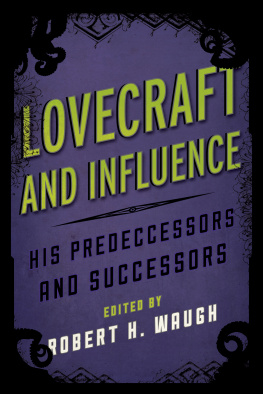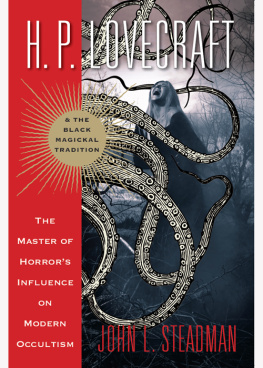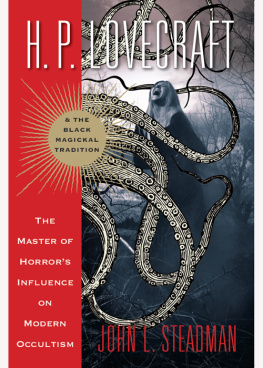Studies in Supernatural Literature
SERIES EDITOR: S. T. JOSHI
1. Lovecraft and Influence, edited by Robert H. Waugh, 2013.
Lovecraft and Influence
His Predecessors and Successors
Edited by Robert H. Waugh
Studies in Supernatural Literature
THE SCARECROW PRESS, INC.
Lanham Toronto Plymouth, UK
2013
Published by Scarecrow Press, Inc.
A wholly owned subsidiary of The Rowman & Littlefield Publishing Group, Inc.
4501 Forbes Boulevard, Suite 200, Lanham, Maryland 20706
http://www.scarecrowpress.com
Estover Road, Plymouth PL6 7PY, United Kingdom
Copyright 2013 by Scarecrow Press
All rights reserved. No part of this book may be reproduced in any form or by any electronic or mechanical means, including information storage and retrieval systems, without written permission from the publisher, except by a reviewer who may quote passages in a review.
British Library Cataloguing in Publication Information Available
Library of Congress Cataloging-in-Publication Data
Lovecraft and influence : his predecessors and successors / edited by Robert H. Waugh.
pages cm. -- (Studies in Supernatural Literature)
Includes bibliographical references and index.
ISBN 978-0-8108-9115-9 (cloth : alk. paper) -- ISBN 978-0-8108-9116-6 (ebook) 1. Lovecraft, H. P. (Howard Phillips), 1890-1937--Criticism and interpretation. I. Waugh, Robert H., editor of compilation.
PS3523.O833Z755 2013
813'.52--dc23
2012051829
The paper used in this publication meets the minimum requirements of American National Standard for Information Sciences Permanence of Paper for Printed Library Materials, ANSI/NISO Z39.48-1992.
Printed in the United States of America
Abbreviations
AG | Letters to Alfred Galpin (Hippocampus Press, 2003) |
AT | The Ancient Track: Complete Poetical Works (Night Shade Books, 2001) |
CE | Collected Essays (Hippocampus Press, 200406; 5 volumes) |
D | Dagon and Other Macabre Tales (Arkham House, 1986) |
DH | The Dunwich Horror and Others (Arkham House, 1984) |
FF | O Fortunate Floridian: H. P. Lovecrafts Letters to R. H. Barlow (University of Tampa Press, 2007) |
HM | The Horror in the Museum and Other Revisions (Arkham House, 1989) |
LL | Lovecrafts Library: A Catalogue, 3rd ed. (Hippocampus Press, 2012) |
MM | At the Mountains of Madness and Other Novels (Arkham House, 1985) |
MW | Miscellaneous Writings (Arkham House, 1995) |
RK | Letters to Rheinhart Kleiner (Hippocampus Press, 2005) |
SL | Selected Letters (Arkham House, 196576; 5 volumes) |
ST | The Shadow out of Time (Hippocampus Press, 2001) |
Introduction
Robert H. Waugh
Even as an undergraduate many years ago, I learned that every author lives within a web of texts. We call this experience influence, but it is much more immediate than that word suggests; just as we do not live unless we first live within the flesh of our mothers, no author lives without the words learned in our mother tongue, and no author lives without learning from others how phrases, sentences, paragraphs, and whole narratives have been shaped by someone else; and every author passes these materials on. There is influence, conception, affinity, and so much else.
This book is an exploration of how influence worked in the life of Howard Phillips Lovecraft. He is famous above all for his invention of the modern weird tale, but he did not come upon this invention without an extensive reading in his predecessors, as can be quickly seen in scanning his groundbreaking survey, Supernatural Horror in Literature. Much that he read for that work, to say nothing of the books he read as a child in his grandfathers library, would provide material for more essays than this collection can contain, so I confess that after some fifty years we are still only beginning the investigations that need to be undertaken. The pressure of influence in Lovecraft can also be seen in his exploration of various styles throughout his career. After much contention, we have realized that Lovecraft employed no one style, and this variety came about in part through his encounter with his predecessors.
In this anthology, the first chapter is by Robert Price, an old hand in Lovecraft studies, and focuses on the use Lovecraft made of the Bible, an aspect of Lovecrafts work we are too likely to ignore because of his outspoken agnosticism. A very different field of interest occupies J. D. Worthington in his investigation of the influence British authors such as Swift and Pope and Johnson exerted on Lovecraft, the writers he read with great devotion as a precocious child. The third chapter, by James Goho, a recent scholar in these matters, addresses the complex problem of Lovecrafts relations with the wide diversity of the American Gothic authors. Donald Burleson, perhaps best known for his deconstructive study of Lovecrafts stories in his book Lovecraft: Disturbing the Universe, undertakes in the fourth chapter an examination of Lovecrafts work vis--vis one of the most famous of the American Gothic authors, Nathaniel Hawthorne, making a number of assertions that bear a global significance for the relationship between Hawthorne and Lovecraft, as well as other assertions that enlighten us in small details. In the fifth chapter, Alex Houstoun, another recent scholar in Lovecraft studies, deals with the other most famous of the American Gothics, Edgar Allan Poe; the focus of his study is Poes treatment of his narrators and the way in which this treatment influenced Lovecrafts treatment of his own narrators. The last three chapters of the first part of the book bring these studies much closer to Lovecrafts time. Darrell Schweitzer examines the influence Lord Dunsany exerted on Lovecraft, an influence that has been recognized for many years but that has lately been too ignored; Schweitzer demonstrates the strengths Dunsany offered the burgeoning author and in part creates a stirring appreciation of an author too little appreciated. Gavin Callaghan investigates the various rich influences that the Munsey pulp magazines exerted on the omnivorous Lovecraft; and T. R. Livesey traces the single theme of the invasion narrative, so popular in the literature of the 1890s and 1900s, and its influence on Lovecrafts story The Shadow over Innsmouth.
After this first part we turn to the influences that Lovecraft exerted on the authors who came after him. In the first essay of the second part, Norm Gayford, well known for his essay on Lovecrafts relations with modernism, investigates his relations with Frank Belknap Long, whom we may regard as Lovecrafts first disciple. In the second essay, S. T. Joshi examines the broad influence Lovecraft had on Ramsey Campbell, the most famous of the British horror writers in the post-Lovecraft period; this study is especially striking in that it follows Campbells engagement throughout his career. I then present the various influences Lovecraft had on three science fiction authors, very different from one another: Arthur C. Clarke, Fritz Leiber, and Philip K. Dick. In another vein, Michael Cisco investigates William S. Burroughss broad affinity to Lovecraft and his handling of Lovecraftian materials. John Langan in the next chapter considers the influence of Lovecraft on Stephen King; this is an influence that King has confessed to, as though confession were necessary, but Langan looks at it in the light of Kings novella Graveyard Shift and Lovecrafts The Rats in the Walls. Steven J. Mariconda examines Lovecrafts influence on the dark work of Thomas Ligotti, whom many readers now consider our contemporary master of the weird tale.






